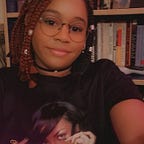Lessons from a Well-Read Black Girl
Well-Read Black Girl: Finding Our Stories, Discovering Ourselves is a non-fiction anthology compiled of essays written by black women writers sharing how their impactful experiences with literature shaped the women that they have become. The anthology’s editor Glory Edim is the founder of the Well-Read Black Girl book club turned online community, which was started in 2015. Edim has managed to gather a multitude of strong and valuable female voices to reflect on how literature can affect the way we see ourselves and ultimately how we come to discover who we are meant to be and what we want to accomplish in life. As an avid reader who happens to be black and female, I found myself not only feeling recognized in the voices and experiences of these women but assured that the fight for literacy and inclusion, specifically within the black community, is something that will always be worth discussing.
While this anthology was full of lessons that I think would be insightful for any reader of this collection here are some points that really stuck out to me.
- Too many readers of color have the same disappointing experience with literature
Having to engage with texts that present a limited variation of experiences and perspectives from a singular group: white (mostly male) and heterosexual. While engaging with experiences that contrast from our own can be enlightening and successful in expanding our worldview, the problem arises when we are only offered these perspectives. When this happens we are deprived of voices that may validate the importance of those that reflect our own. In her essay “Go Tell It”, feminist scholar and activist Barbara Smith described the state of books during her childhood in the 1950s as “a blizzard of white”. The sentiment still applies to the current state of literature in many, if not most, educational and literary spaces. However, I think it’s also fair and promising to say that this “blizzard” is waning, albeit slowly, and more colorful and sundry skies lie ahead of us.
2. Despite this, each of our personal journeys with literature is unique and distinct
Even though an unsettling amount of POC readers, or minorities in general, have the misfortune of being overwhelmingly saddled with white and alien perspectives, our personal experiences and encounters with literature is unique to who we are as individuals. Even when we’re able to connect with the same piece of literature for similar reasons, that same piece of literature may have some contrasting effect on our distinct point-of-view. In “Dreaming Awake”, best-selling science fiction and fantasy writer N.K. Jemisin shares,“…here is why I write what I do: We all have futures. We all have pasts. We all have stories. And we all, every single one of us, no matter who we are and no matter what’s been taken from us or what poison we’ve internalized or how hard we’ve had to work to expel it -we all get to dream.”
3. Attaining stories in which we see ourselves means attaining knowledge of not only others but ourselves
There are no limits to what literature can reveal to us. Whether it’s an experience that we have not encountered ourselves or a group of people that we wouldn’t otherwise have a personal interaction with, literature provides us with voices that can further open our minds and consciousness in an abundance of ways. More important though, is how literature can expand our view of ourselves and how we fit into the framework of the people and world around us. In her essay “Zora and Me” author and co-founder of the Zora Neale Hurston/Richard Wright Foundation Marita Golden writes, “Zora did not teach me how to write. She taught me how to live, how to laugh, and how to love. Her canon is a master class in the art of living.”
4. Representation (or lack of it) can be life-altering
In her essay “Space to Move Around In” Renee Watson, author of Piecing Me Together, looks back on her girlhood as she dealt with negative perceptions of her own body before being introduced to poems like “homage to my hips” and “homage to my hair by poet Lucille Clifton’s which allowed her to accept the fact that she didn’t need to fit traditional standards in order to feel beautiful. She says, “Lucille’s words were oxygen. These poems healed every aching part of the seven-year-old girl in me.” Watson also shares the questions that confronted her while reading these works. Questions like, “What does it mean to celebrate the part of you that others demean, disregard, disapprove of? How does a woman hold on to her self-worth when so many forces want to disvalue her? How does a black woman make space for her truth, her body?” Though these questions weren’t addressed in the class led by her white male teacher, Watson shares how she was able to appreciate the poems on a deeper level because they, “stood up” for her, in spite of her teacher’s surface-level teaching of them.
